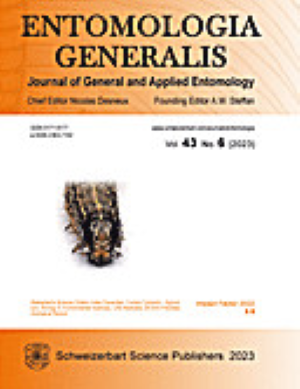Assessment of the impact of pea albumin 1 subunit b (PA1b) on Tuta absoluta through foliar application and microinjection
IF 4.6
1区 农林科学
Q1 ENTOMOLOGY
引用次数: 0
Abstract
Tuta absoluta, one of the most damaging pests of tomato crops and other solanaceous plants, has been extensively managed by the use of synthetic pesticides. Unfortunately, the reliance on chemicals has negatively affected human health, biodiversity, and the environment. Therefore, the development of eco-friendly alternatives is highly encouraged to replace hazardous chemical pesticides. Inhibitory cystine knot (ICK) peptides have a leading future as they present a narrow spectrum activity, and remarkable stability, making them promising bio-insecticide modalities against pests of crops of economic importance. In this study, the impact of Pea albumin 1-b (PA1b), a plant ICK peptide extracted from seeds of peas (Pisum sativum, Fabaceae) was investigated through foliar application to be delivered to 2nd instar larvae of T. absoluta. However, due to the failure of delivery upon foliar application, microinjections of the peptide into 3rd instar larvae were performed to assess the insecticidal activity of PA1b when being into the body cavity of the larvae. Toxicity bioassays were conducted in Petri dishes in a developed experimental arena that allowed us to easily survey the status of the larva and the leaf for up to 18 days. Our study showed that PA1b has a significant toxic effect against T. absoluta when delivered through injection. Further studies must be conducted to optimize the administration of PA1b into the larvae of T. absoluta, investigate the binding sites of the peptide in this pest, and ascertain the insecticidal capacity of such a peptide at an agricultural-relevant scale.通过叶面喷施和显微注射评估豌豆白蛋白 1 亚基 b (PA1b) 对 Tuta absoluta 的影响
Tuta absoluta 是对番茄作物和其他茄科植物危害最大的害虫之一,人们一直在广泛使用合成杀虫剂进行防治。遗憾的是,对化学品的依赖对人类健康、生物多样性和环境造成了负面影响。因此,大力鼓励开发生态友好型替代品,以取代有害的化学农药。抑制性胱氨酸结(ICK)肽具有窄谱活性和显著的稳定性,使其成为一种很有前途的生物杀虫模式,可用于防治经济作物上的害虫。本研究调查了豌豆白蛋白 1-b(PA1b)的影响,这是一种从豌豆(豆科植物)种子中提取的植物 ICK 肽,可通过叶面喷施作用于 T. absoluta 的二龄幼虫。然而,由于叶面喷施未能成功,因此对三龄期幼虫进行了多肽微注射,以评估 PA1b 进入幼虫体腔后的杀虫活性。毒性生物测定是在培养皿中进行的,实验场地已开发完毕,可以方便地调查幼虫和叶片长达 18 天的状况。我们的研究表明,PA1b 通过注射对 T. absoluta 有显著的毒性作用。我们还必须开展进一步的研究,以优化 PA1b 对 T. absoluta 幼虫的施用,调查该肽在害虫体内的结合位点,并确定这种肽在农业相关规模上的杀虫能力。
本文章由计算机程序翻译,如有差异,请以英文原文为准。
求助全文
约1分钟内获得全文
求助全文
来源期刊

Entomologia Generalis
生物-昆虫学
CiteScore
7.10
自引率
18.80%
发文量
72
审稿时长
>12 weeks
期刊介绍:
Its scope covers all aspects of basic and applied research dealing with insects and more broadly with arthropods inhabiting wild, agricultural and/or urban habitats. The journal also considers research integrating various disciplines and issues within the broad field of entomology and ecology.
Entomologia Generalis publishes high quality research articles on advances in knowledge on the ecology and biology of arthropods, as well as on their importance for key ecosystems services, e.g. as biological control and pollination. The journal devotes special attention to contributions providing significant advances (i) on the fundamental knowledge and on sustainable control strategies of arthropod pests (including of stored products) and vectors of diseases, (ii) on the biology and ecology of beneficial arthropods, (iii) on the spread and impact of invasive pests, and (iv) on potential side effects of pest management methods.
Entomologia Generalis welcomes review articles on significant developments in the field of entomology. These are usually invited by the editorial board, but proposals may be sent to the Editor-in-Chief for preliminary assessment by the editorial board before formal submission to the journal. The journal also considers comments on papers published in Entomologia Generalis, as well as short notes on topics that are of broader interest.
 求助内容:
求助内容: 应助结果提醒方式:
应助结果提醒方式:


